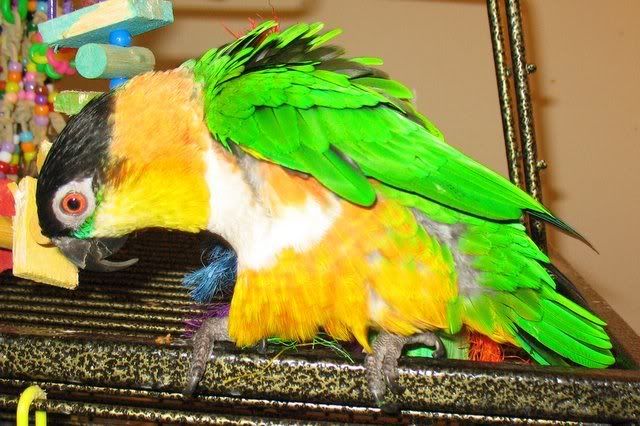Of my 6 parrots, 5 have all of their flight feathers, with the option to fly. I almost wrote that 5 are flighted, but that misrepresents the status of two of them. Although we work on it, Daphne (budgie) and Calypso (caique) rarely fly.
Daphne likes to hold on to a perch or my finger and flap her wings, but rarely chooses to propel herself using this method. I don't understand it, as she is quite a good flyer, ably navigating corners and gracefully landing. I suspect her English budgie genes (she's 1/2 English and 1/2 American) for her staid demeanor. Our much-loved previous budgie, Ethel, loved flying and spent much of her too-short time with us zipping around.
Calypso has occasionally flown unaided, but prefers to have me support his chest as he flaps.
Rocky (severe macaw), unfortunately, is clipped, as he has yet again proven himself too untrustworthy with wings. With even 1-2 flight feathers per wing, he uses his new-found freedom to launch vicious, unprovoked, aerial attacks on me.
My other three, Max (timneh grey), Beeps (caique), and Stella (congo grey) are all excellent flyers, and choose to do so regularly.
All of my birds were clipped at one point. When we first got Max, all of the information I could find on the Internet recommended clipping. It was all so one-sided. I didn't really feel like I was making a choice. Good, responsible parrot owners clip their birds, and I wanted to provide her the best captive life I could. We never even thought about not clipping her.
My other 5 were obtained from the parrot rescue where I volunteer, and each bird is clipped upon intake.
When Max started plucking, almost 3 years ago now, I started doing as much research as I could into feather destruction. One of the articles that I came across was this one. I wish that this was required reading for new and prospective parrot owners. I hadn't really thought about clipping as a choice before. It was just what was done.
As I've said before, I don't think having a flighted parrot is right for everyone. I don't think it's right for every bird (see Rocky). There are risks. But I do think that everyone should think about it and make a decision.
What a long introduction for this post, especially since I've already written about this here!
In my opinion, it is important for flighted birds to have the skill of recall. Basically, coming to you when they're called. In our house, Max is pretty good at recall, and we're still working with the others. It hasn't been as high on my priority list as it should be. I'm hoping this post will give me a kick in the pants with Beeps and Stella.
With good recall, a parrot owner has a better chance of recovering a bird that escapes outside, has been located in a tree, and is afraid to come down. In an ideal world, this scenario would never happen, of course. It's also a fun learning experience for these intelligent creatures.
With Max, I hold my hand flat, with the palm facing the floor. Then, I say, "Max, come here," and usually she does. We've particularly been working on flying down. I'll place her on top of a door, or the fridge, or something else tall, then crouch down and tell her to fly to my hand. Flying down is a skill that would also come in handy if she's stuck in a tree.
Hopefully it never comes to that, and it remains a fun game we play, not something where her life depends on it. We are very careful with our flighted birds. Still, life is not 100% predictable. A tree could crash into a window when they're out. We could be broken into and the parrots released. We could get into a car accident while on our way to the vet that also opens their carriers.
I've been working on my goals for 2009, and I think I'm going to add recall for Stella and Beeps to that list.
Subscribe to:
Post Comments (Atom)


No comments:
Post a Comment